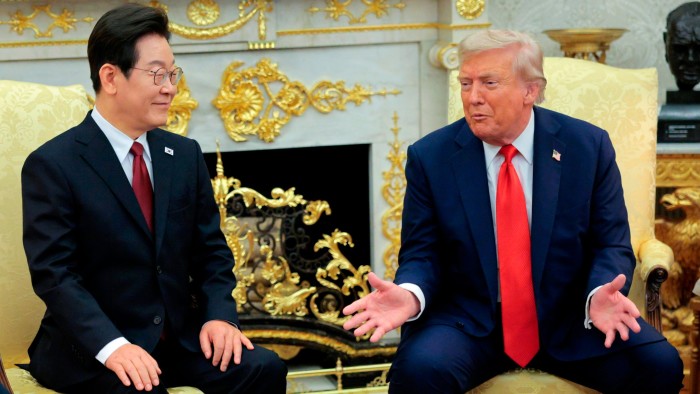Unlock the Editor’s Digest for free
Roula Khalaf, Editor of the FT, selects her favourite stories in this weekly newsletter.
South Korea and the US are struggling to finalise the terms of their trade deal, as Seoul resists pressure from Washington to allow Donald Trump to decide where billions of dollars of its capital should be invested in the US.
Seoul’s trade minister Yeo Han-koo is in Washington for talks with US trade representative Jamieson Greer, more than two months after the two sides announced South Korea would make $350bn in American investments in exchange for the US reducing its threatened tariffs from 25 to 15 per cent.
“The devil is in the details. We are in tense negotiations over the details,” Yeo said upon arriving in Washington on Monday.
The South Korean government has balked at Washington’s insistence that it follow Japan’s lead in letting Trump decide where hundreds of billions of dollars’ worth of its capital is invested in the US, according to several people familiar with the talks. Relations have also been strained by the detention of hundreds of Korean workers in Georgia in an immigration raid.
“We will not conduct negotiations that are not rational or fair — that’s why it is difficult,” said South Korea’s leftwing president Lee Jae Myung last week. “On the surface, the ongoing talks appear rough, aggressive, excessive, irrational and nonsensical, but the final conclusion will end up being rational.”
When the deal was announced in late July, the US president wrote in a social media post that Asia’s fourth-largest economy had agreed to “give to the United States $350 Billion Dollars for Investments owned and controlled by the United States, and selected by myself, as President”.
 © Kim Hong-ji/Reuters
© Kim Hong-ji/Reuters
But Lee’s policy chief Kim Yong-beom immediately countered that the majority of funds would come from loans and guarantees offered by state-run financial institutions and also included the tens of billions of dollars already being committed by Korean companies in the US.
The pressure on South Korea increased after Japan agreed to fund $550bn worth of projects as part of its trade deal. That means that Japanese exports will be subject to a 15 per cent tariff, giving Japan’s auto companies a clear advantage over their Korean rivals, still subject to a 25 per cent tariff.
“The Japanese signed the contract,” US commerce secretary Howard Lutnick told CNBC in an interview last week. “The Koreans either accept the deal or pay the tariffs. Black and white. Pay the tariffs or accept the deal.”
But senior South Korean officials say that their country is not in a position to replicate Japan’s deal due to its smaller foreign currency reserves and the lack of a currency swap agreement with the US.
Jennifer Lee, managing director at the Asia Group consultancy in Washington, said the South Korean won is “significantly more volatile compared to the Japanese yen in global markets, and Korea’s foreign currency reserves — about one-third the size of Japan’s — are comparatively limited”.
“As a result, if South Korea is to mirror the US-Japan investment deal, its foreign exchange market could become highly volatile, with a significant risk of downward pressure on the won.”
In theory, the $350bn figure includes $100bn committed to US energy purchases, with another $150bn committed to a joint shipbuilding initiative branded “Make America Shipbuilding Great Again” [sic], or Masga. Seoul has said it will provide loans and debt guarantees for Korean investment projects in the US.
But several people representing Korean conglomerates and industry groups said that they have not seen any calculations or timeframe for this investment. “There is no breakdown of Korea’s investment figure for the US and no one knows who is investing how much,” said Choi Byung-il, a former Korean trade negotiator and professor emeritus at Ewha Womans University in Seoul.
The White House did not respond to a request for comment.
Recommended

Some commentators have argued that the fallout from the immigration raid will complicate the talks.
“Korean companies have watched with dismay as their workers were hauled away by immigration agents, creating a chill with regard to now being asked to commit to new investments,” said Wendy Cutler, a former US trade negotiator now at the Asia Society think-tank.
But an executive from a leading Korean industry group said that, while the episode “can give Korea a good pretext for asking for bilateral co-operation on issues like expanding a visa quota for Korean technicians, it won’t be an excuse for changing the broad framework of the trade deal”.


AloJapan.com